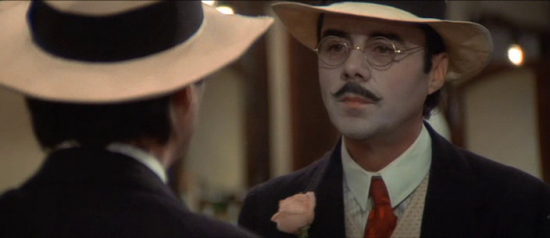
There is a cruelty present in aesthetic philosophy easy to overlook when conveyed in academic language. Luchino Visconti's 1971 film Death in Venice, based on a Thomas Mann novella, highlights the personal pain that can result in a struggle between Dionysian and Apollonian. It is a film of beautiful, lingering images paralleled by slow, inevitable death.
The story follows a fictional, famous German composer named Gustav (Dirk Bogarde) who travels to Venice for his health. It's not specified what his health issue is, but it seems as though it may be a nervous breakdown due to violently negative reactions to his recent work. Or perhaps it's more accurate to say he suffers from a profound, spiritual horror as the failure of his self-consciously artificial composition proves his vehemently Dionysian friend correct in his criticism of Gustav's aesthetic philosophy.

Gustav's friend rejoices in victory, perhaps not suspecting the cruelty in what is happening to Gustav. In discussing his point of view in contrast to his friend's philosophy of artistic beauty being that of the senses, Gustav says, "Reality only distracts and degrades us . . . The creation of beauty and purity is a spiritual act . . . It's only by complete domination of the senses that you can ever achieve wisdom, truth, and human dignity."
When one considers that Gustav is a closeted homosexual and is forced to live with the death of a young daughter, it's no wonder that he should regard reality as an enemy. It's in Visconti's gentle, sensual filmmaking, particularly in Gustav's helpless, compulsive observing of an attractive Polish boy staying at his hotel, that the wonder of irrepressible reality is impressed on Gustav and us.

In a final, persuasive stark contrast, a barber makes over Gustav with absurd white face paint and hair colour in an attempt to triumph over his natural aging which is contrasted with both a cholera epidemic in Venice and Gustav's continued, unavoidable admiration of the Polish boy. But one doesn't sympathise with the glee Gustav's friend feels in being right. Perhaps one of the strongest pieces of evidence of the supremacy of the Dionysian over the Apollonian is that it serves no-one's agenda or comfort.


No comments:
Post a Comment